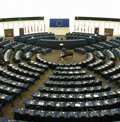 The report, endorsed by the committee on public health (ENVI), is critical of the roles played by health authorities and the vaccines industry during the pandemic which began in 2009.
The report, endorsed by the committee on public health (ENVI), is critical of the roles played by health authorities and the vaccines industry during the pandemic which began in 2009.
It urges the WHO to revise its pandemic alert system to take account of severity of disease rather than basing its definition on the spread of a novel virus. MEPs also want EU institutions to apply common conflict of interest definitions and to publish experts’ declarations of interest.
This follows concerns that health authorities were advised by experts who had links to the vaccine industry, something the European Parliament report says has led to “suspicions of undue influence and harm” to the credibility of key institutions.
This, say MEPs, has not been helped by the reported reluctance of vaccine manufacturers to accept liability for the “quality, safety and efficacy” of their products in pandemic situations – something the report says shook public trust in vaccine safety.
“Confidence in vaccines against H1N1 influenza was also undermined by incomplete and contradictory communication on the benefits and risks of vaccination and the potential risks of H1N1 influenza to the public,” the report says.
The move comes as political and health authorities across the globe reflect on how they dealt with H1N1 influenza
WHO chief Margaret Chan has announced a review of how her Organisation handled the outbreak. An independent committee led by Dr Harvey Fineberg is drafting a report which will look at how decisions were made during the crisis. The WHO is also reviewing its definition of pandemic and is expected to include severity of disease as a key criterion in assessing future outbreaks.
The ECDC has compiled a list of reports published by various authorities examining the fallout from the pandemic. The running theme is that communication should have been given more attention and that transparency issues must be addressed.
European Parliament sees bigger role for ECDC
The Parliament wants the European Centre for Disease Prevention and Control (ECDC) to review national influenza preparedness plans and advise on crisis management, vaccination and communication strategies.
Greater coordination between EU member states is required, according to MEPs, although this could ruffle feathers in some health ministries as health policy is a matter for national governments, according to the European Treaty
Amendments to the first draft of the report, written by French Green MEP Michèle Rivasi, have toned down some of the language put forward by Rivasi but the version to be voted on in Strasbourg highlights a range of shortcomings by EU and international institutions.
MEPs on the European Parliament’s public health committee deleted Rivasi’s call for the European Commission to audit the European Medicines Agency and the ECDC to assess the costs of the pandemic.
Industry stresses need for investment
The vaccines industry has said that the question of experts’ independence is far from black and white. Finding knowledgeable experts who has never interacted with companies involved in immunology research is no mean feat. Indeed, some argue that comprehensive understanding of vaccines requires such interaction.
Michael Watson, representing the European Vaccine Manufacturers (EVM) told a hearing in the European Parliament this week that the response to the pandemic was imperfect but should be seen as successful given the complexity of mounting a global response to a novel pathogen.
He said manufacturers had made “huge investments of time, money and resources in pandemic vaccine research and development, in clinical studies, in regulatory activities and in adaptation and expansion of production facilities” to meet global demand.
Watson said the industry had done this largely at its own risk, demonstrating a long-standing commitment to public health. This investment is only sustainable if vaccine firms continue to be viable profit-making entities which can sustainably invest in vaccines for the next pandemic and the host of other vaccine preventable diseases still waiting to be conquered, he added.
“The public good from vaccines is only possible if there is a return on the investment and this return on investment will in turn generate greater public good,” Watson told the hearing hosted by the European People’s Party, the European Parliament’s largest political grouping.
The industry representative also said improvements are needed in technical, regulatory and logistical aspects of accelerating vaccine supply. Watson also said lessons must be learned in how to engage with the public on issues around vaccination.





Erwin Alber
June 5th, 2011
As far as I am concerned, vaccination is an organised criminal enterprise dressed up as disease prevention.
? Bobály Mihály (@jabjabhu)
July 10th, 2012
@jetcool @strob És én e miatt kétkedem a gyógyszergyártók és döntéshozók szándékaiban. http://t.co/XCVw0sa0 http://t.co/kehpTZXN